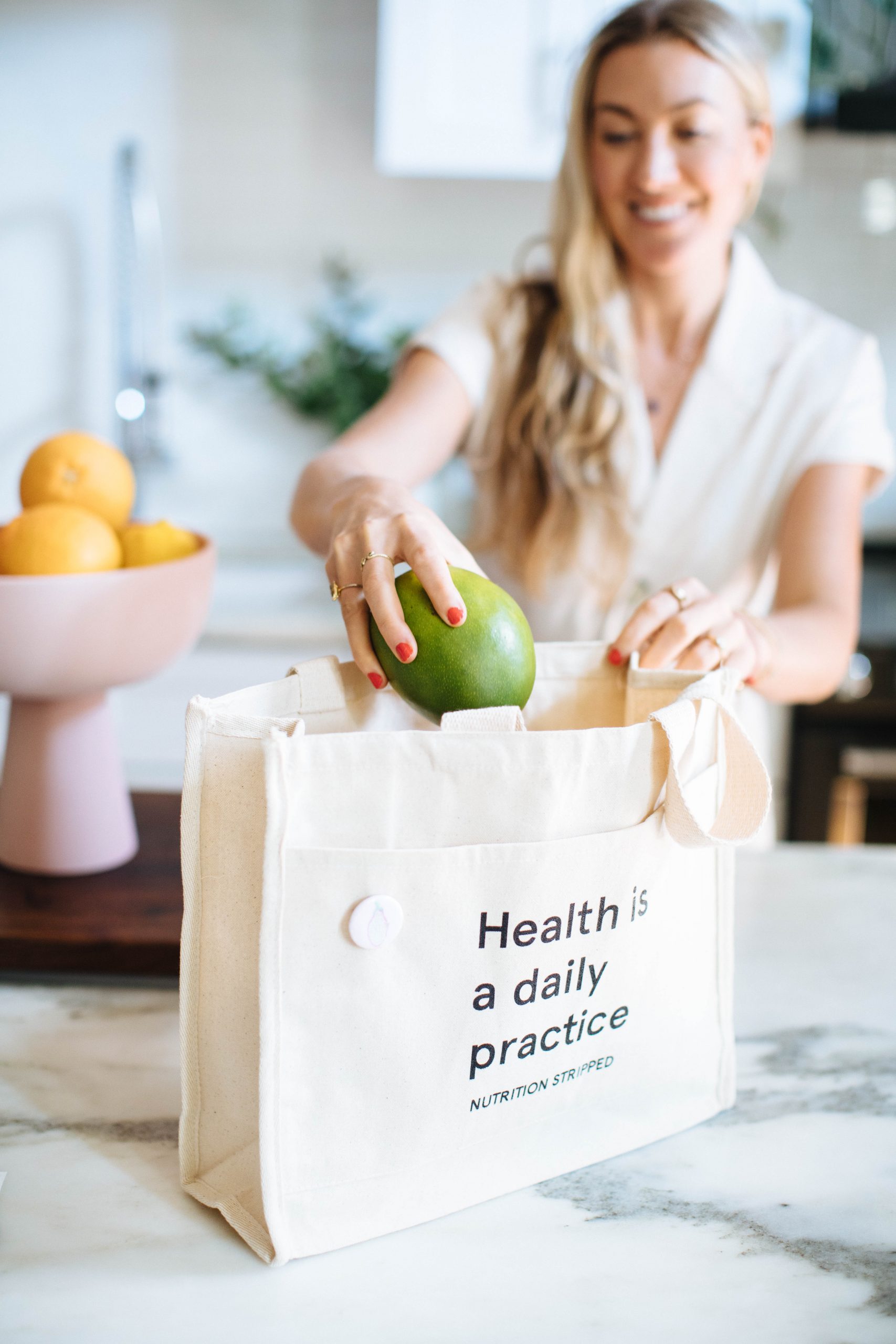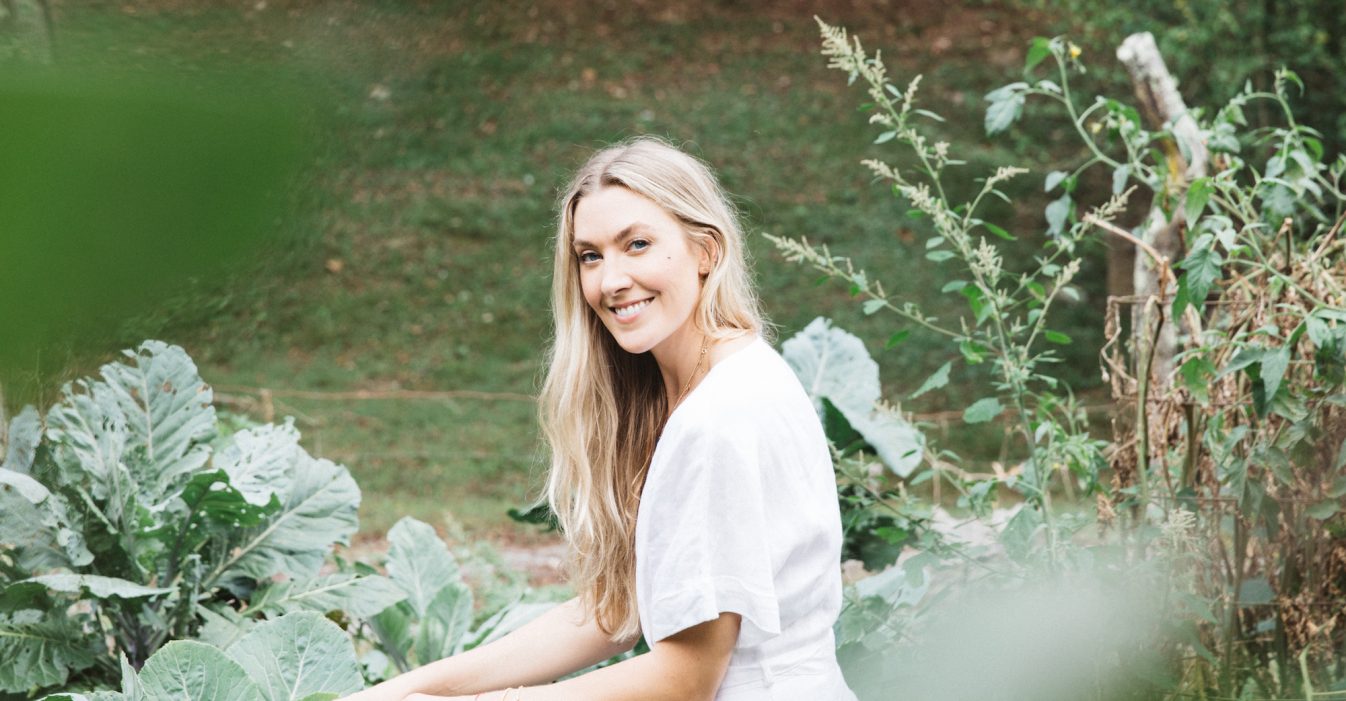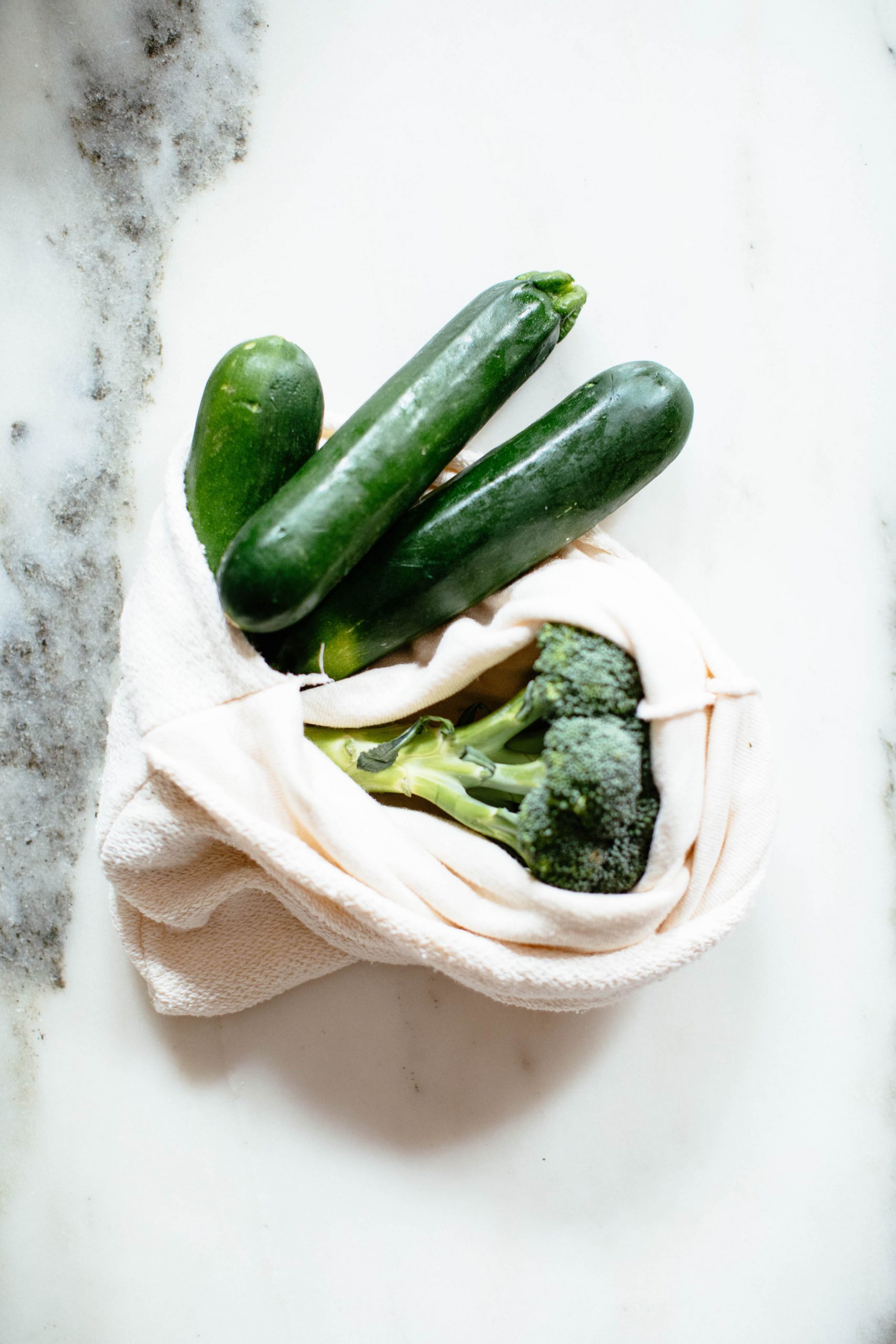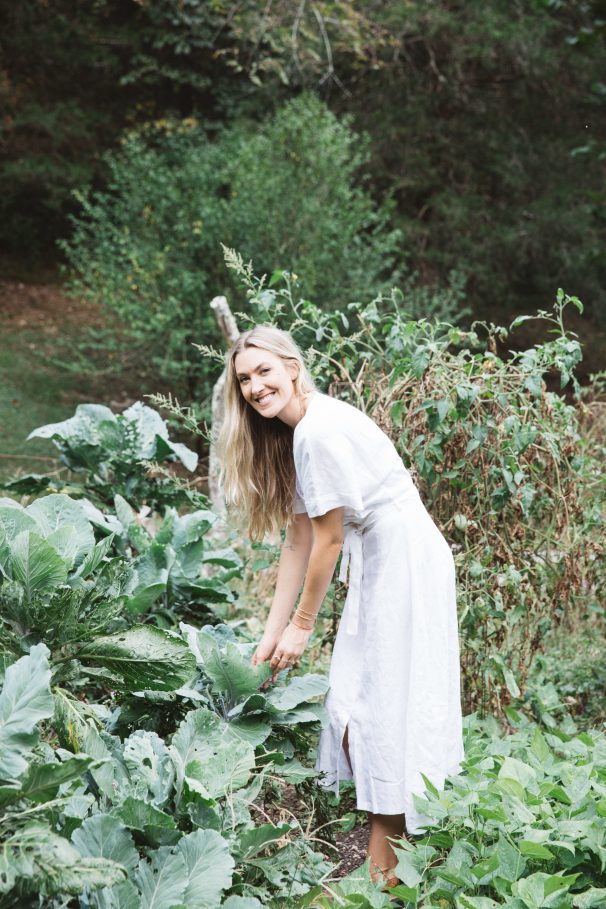Practicing sustainable living is such an important part of a healthy lifestyle.
Our daily choices have a direct impact on Mother Nature and affect everything including the air we breathe, the water we drink, and the foods we eat — all of which contribute to our wellbeing.
That’s why as a dietitian, I incorporate tips for living sustainably in as much as I can because I truly believe it plays a large role in our overall wellbeing.
Living a more sustainable lifestyle doesn’t mean you need to live one with nature in the middle of a forest. You can take small daily steps to support the harmony of our human impact on the environment no matter where you live.
Just as health is a daily practice, so are the practices that impact the health of Mother Nature. And trust me, they’re not as difficult or laborious as you may think!
Becoming more aware of the small actions you can take each day to positively support the earth and reduce the resources we use is key to living a more sustainable lifestyle.
My Journey to with Sustainable Living
I’m really excited to be finally sitting down to write more about this topic since my husband Jesse and I have embarked on a big lifestyle change for us this year. We’re building a home — one with Mother Nature — in the forest of TN to live the most sustainable lifestyle we possibly can in order to take care of our environment, live more aligned with our needs, live out our future dreams (more on this later), and educate about this experience so more of you can do this no matter where you are.
Our dreams of living as sustainably as possible and in harmony with nature has been a dream of mine since a child and one that my husband lived for the first 15 years of his life. For him, it’s a returning to his home base and for me (and Luna!) it’s about finally exploring and living in a way that’s aligned with my core values.
I share this with you because as I’m writing this, we live in a city loft in Nashville far from nature and we take small daily actions to live more sustainable. There are so many steps you can take no matter if you’re living in a city like we currently are or if you live in the forest like we will be! We all can do our part today.
You don’t need to live in nature to protect, respect, and honor nature.
Now more than ever, there’s more awareness, insight, and data backing the notion that we need to take drastic measures as a collective in order to support the health and wellbeing of our planet.
That may sound dramatic or like there’s a lot of weight on our shoulders, but by each of us doing our part every single day in taking action towards living a more sustainable lifestyle in harmony with the earth, the more positive impact we’ll personally experience and generations to come.
Before we dive in with tangible tips and steps you can take each day to live more mindfully about sustainability, let’s first define and understand what this lifestyle means.
What Is A Sustainable Lifestyle?
Living a sustainable lifestyle is about taking intentional action towards using methods that are sustainable to the earth and our environment in a way that doesn’t deplete a resource, but works in harmony and in ways to support its long-term existence.
Like nutrition, sustainability is a holistic approach and involves many elements of our lifestyle from the food we choose to eat, choosing non-toxic options for our homes, the water we consume, to the electricity to keep our lights on.
With sustainable living, it’s important to adopt the mantra that sustainability is a 365-day job, not an overnight fix. Taking or not taking one sustainable action doesn’t make or break your efforts — have a long-term mentality with living sustainably. You can do your best in each situation, without being hard on yourself if it’s not perfect.
Sustainable Nutrition
Making more conscious choices with your food is a great place to start since you’re already buying food every week. With a few more conscious choices, you can make a great impact on living sustainably.
Sustainable eating puts the focus on foods that are produced in a way that is beneficial for the environment, supports local communities and is humane to farmers, workers, and animals alike.
Sustainable food production is incredibly important, not just for the sake of our planet, but also for our health and future as well. Opting for some of the most sustainable foods whenever possible can help minimize greenhouse gas emissions, decrease food waste, and reduce exposure to harmful chemicals, additives, and preservatives that are abundant throughout the food supply.
Know Where Your Food Comes From and Support Local, Small and Organic Companies
- Start asking yourself where your food comes from. How was the food grown or cared for? How is the person who took care of this food, cared for? Were the animals taken care of in an ethical way
- Eat more sustainable foods like beans, potatoes, peas, and more
- Sign up for a local CSA to support your local farmers and get fresh produce each week
- Become a member of a co-op to support local farmers and local food companies
- Go meatless several times a week if possible, if consuming animal proteins be sure to read our guide here and learn about factory farming to be more aware
- Look for food products that are free from added sugars and refined oils
- Start supporting more ethical, fair-trade, and organic small food companies
Make Your Own Food to Reduce Packaging
- Start a mini-herb garden in your kitchen using a few pots by a window
- Start a small planter garden on your deck or patio
- Have a yard space? Then start your own mini-garden to grow your own food! Not only will you save money from weekly grocery store trips but you’ll have a direct connection with your food from growing to cooking – what a beautiful experience!
- Make it a fun experience to make your own foods from bulk or package-free ingredients, like homemade salad dressing, sauces, nut milk, and even dog treats!
Reduce Your Food Waste
- Cook more meals from home to help reduce takeout and disposable container waste
- Reduce food waste by proper meal planning, cooking, and using your leftovers
- Use reusable meal prep contains such as glass jars or containers with airtight lids to keep food fresher for longer
- Have food scraps? If composting is an option in your area, look at getting a subscription or if you have a yard then start your own compost bin or use a kitchen compost bin!
Make the Switch from Single-Use Plastic and Goods
- Ditch the straws altogether or at least have a few reusable straws on hand
- Bring your own water bottle, coffee mug, or fillable container to your favorite coffee, smoothie, or tea shop
- Don’t forget your reusable market totes when you go grocery shopping
- Recycle, reuse, and reduce single-use plastic wherever possible
- Repurpose glass jars and containers food comes in, for pantry staples like beans and nuts
- When cleaning the kitchen after cooking, use cloth towels instead of paper towels
Sustainable Daily Habits
- Invest now in high-quality items, so you don’t have to keep replacing them later on
- When possible, pick up trash you see and dispose of it safely
- Walk or go biking instead of driving in your car as much as possible or carpool with friends
- Plant a tree or community garden
- Borrow books, magazines, supplies from friends and family instead of purchasing new if you don’t need to
- Spend as much time out in nature as possible! Meditate outside in nature and observe mindfully to feel connected to Mother Nature
Making Your Home Align With a Sustainable Lifestyle
You absolutely don’t need to go out and completely transform your home overnight, but as you’re replacing items, upgrading, etc. you can be mindful to make healthier choices for your home (and often the environment too!)
Reduce Your Electricity Usage
- Use candles instead of lights or invest in LED lights and turn off the lights
- If you can invest, get solar panels to support your electricity use
- Invest in energy-saving appliances anytime you need to upgrade them
- Turn off any appliances, wifi, and equipment you’re not using
- Instead of using air conditioning or heat, try methods such as cooling energy-saving fans, opening windows, or starting a fire with a stove
- Weatherproof your home by closing off openings that cause air leaks
- Install a thermostat with tighter controls on temperature, shut it off when you’re away
- Enjoy using candle light in the evening and mornings for a cozy vibe
Be Conscious of How Much Water You Use
- Turn off the water that you’re not directly using
- Limit your shower time overall and the number of baths you take
- When washing dishes by hand, use a wash bucket and a rinse bucket to reduce running water
Purchase Non-Toxic Options
- Purchase green cleaning products or make your own DIY version
- Invest in home brands and companies that use green and organic materials like our favorite mattress by Avocado Mattress!
- Opt for non-toxic cookware like my favorite all-in-one pan, The Always Pan


Become a Conscious Consumer in All Areas
We make so many purchases every week or month and each time we buy something, we have the possibility of supporting a business that is conscious of its impact on our planet.
Follow the Zero-Waste Motto for Purchases
- Use What You Have
- Borrow
- Swap or Trade with Someone
- Thrift
- Make Your Own
- Buy New
Sustainable Fashion
- Shop your closet before purchasing anything new — look for ways to reuse or recycle/upcycle clothing items
- If purchasing new clothing items, can you support local small businesses and ones that have a strong mission of giving back, using fewer resources, and environmentally conscious
- Host clothing swaps with friends
- Shop on sites that sell pre-loved clothing
- Invest in higher quality items that you can envision wearing for years to come and that can stand up to wear and tear
- Be mindful of choosing organic and sustainable materials and supporting companies with ethical and green production (You can look for companies on the Good On You site!)
Natural Beauty
- Look for a cruelty-free stamp
- When you can, purchase products that come in glass containers that can be reused
- Shop small batch and artisan businesses
Being More Eco-Conscious at Work
- If you can work from home, do that! It saves on your commute time but also gas and car pollution, even if it’s just a day or two a week
- Print notes and work papers as little as possible
- Go paperless with your monthly bills and subscriptions
- Instead of business cards, create a website or share your LinkedIn account
- If printing, use the draft setting, print double-sided, and recycle the paper afterward
- Unplug all your appliances and equipment before going home for the day or finishing work
- Use online tools and apps to save on paper such as digital to-do lists, project management software, and tracking apps online
- Instead of asking for printed receipts ask for digital copies via email
- Use charger stations or solar charges wherever possible
- When you’re done using a device or upgrading, recycle your old devices safely
Put One of These Sustainable Living Tips Into Practice
What’s one thing you can add to your lifestyle routine this week? Save this blog post to revisit every week in order to add one more small step into your lifestyle routine to gradually grow your toolkit for sustainable living.
NEXT STEPS: HOW YOU CAN MAKE A POSITIVE IMPACT
Whenever we talk about mother nature, gardening, homesteading, and living in a more self-sustainable way, it’s important to acknowledge and learn about the native land you live on and call home. Check out this great resource to learn more about indigenous people that are native to the land you live on, how you can support them now, how to learn more, and share with your communities.
Additionally, if you aren’t able to garden or take self-sustainability acts into your own life, there are amazing resources like this one where you can learn about the local farmers in your area to support.
Making a sustainable change and impact starts with small daily actions. The work for supporting all communities that we support here at NS starts with educating ourselves first and we can all make a positive impact to take care of each other!









